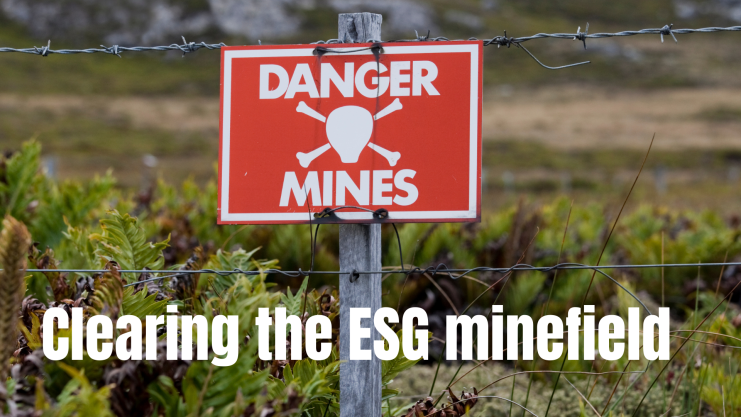Targeting globally comparable disclosure standards

Companies and consumers are increasingly looking beyond climate change as they consider wider environmental social and governance issues. A supportive regulatory foundation therefore is needed to help the financial sector to respond effectively.
It’s not only ethically minded consumers that want to know the source and environmental and human impact of products that they buy, but also corporations and investors have long been demanding a unified Environmental, Social and Governance (ESG) disclosure framework to aid them in their decisions.
Confusion
To date the high number of frameworks and standards has led to confusion and inconsistent disclosure in the market. However, corporate interest in voluntary sustainability reporting is growing as individual countries explore mandatory disclosures.
ESG is high on the regulatory agenda and indeed on the main agenda at Cop26. ‘Finance Day’ of the Glasgow-hosted global shindig saw this knotty subject at the top of the discussion list, because if the financial sector is to help in the transition to a more sustainable future, the markets and financial services firms need high-quality information and clear and uniform standards.
Comprehensive global baseline
The IFRS Foundation (International Financial Reporting Standards) used the day to announce the formation of a new International Sustainability Standards Board (ISSB), with 37 international partners, including the UK, to develop a comprehensive global baseline of high-quality sustainability disclosure standards under robust governance and public oversight to meet investors’ information needs.
The IFRS Foundation also confirmed consolidation of two sustainability reporting organisations, the Value Reporting Foundation and the Climate Disclosure Standards Board, to create a global standard-setter for sustainability disclosures for the capital markets.
Green credentials
The issue of information and reporting was in the minds of the expert panel in our Green Finance Forum ahead of Cop26. For them it is a key issue. As Seb Beloe, partner at WHEB Asset Management, said: “I hope we can bring the threads together sooner rather than later and hopefully the International IRFS standards can bring us that opportunity.”
Zoe Davidson, director of Deloitte Real Estates Advisory said that there exists a real challenge in corporate lending and general investment in reporting what green credentials are: “It’s a minefield across ESG generally. Social value reporting has been an issue for a number of years and there hasn’t been consensus.
“One of the biggest challenges of this market is how to identify something that is trusted and that can come through as something that can be adopted by the whole industry that is impacted by this.”
The prospect of the IFRS Foundation’s announcement was greeted warmly by James Alexander, CEO of UKSIF, but with a note of caution: “What we hope that doesn’t do is create a lowest common denominator and will go beyond that and is forward thinking and engaged.”
Misleading consumers
In January this year the Competition and Markets Authority (CMA) and the Netherlands Authority for Consumers and Markets led a co-ordinated global review of randomly selected websites and found that 40% of green claims made online could be misleading consumers.
Limited public access to information and unlimited advertising has enabled companies to present themselves as guardians of the environment, even as they engage in environmentally unsustainable practices.
Unsubstantiated or exaggerated claims that an investment is environmentally friendly make it harder for investors and consumers to understand how a firm is impacting the environment. But exposing it can also cause problems according to Adam Robbins, senior investor relationship manager at Triodos Investment Management.
“There are more and more organisations out there making noise on greenwashing”, he said. They are creating awareness about what’s going on, but they are also tarring a lot of genuine organisations with a similar brush.
“What we really need to be doing is using some kind of regulation to highlight those that are sustainable but to call out those that are not and show the impact that that is having to create that awareness. Any regulation that is developed and put in place that we might have control of here in the UK needs to be forward looking. It will drive the markets and help clients judge the intended effects and of the investments and solutions as well.”
Different standards
Even though the UK has started to tackle this issue it’s not alone, with other countries also responding. So is there a danger of different standards in reporting and should the UK just simply plough its own furrow?
James Alexander said: “There is a reality that we will diverge further on standards before we realise that it’s madness and we start coming back together and that is going to very tricky. Every government often has their own political reasons as to why they want to do something in a different way. So do we need to start calling this out – investors coming together and saying how do we get the governments of the world to start seeing this as the problem that it is?”
And he offered a solution: “We need to find a way for all of these amazing ESG teams that are employed in the financial services industry to make sure that they are spending time reporting, but also spending as much time as possible strategising and figuring out the future, engaging with management and products teams to really put each of those companies in the right place, that has to be a priority.”
Given where we are at the moment, that is some time off and investors and financiers should be prepared for more regulatory divergence. Yet it’s clear that the power of financial services can be a key force in this transition globally to a sustainable future.